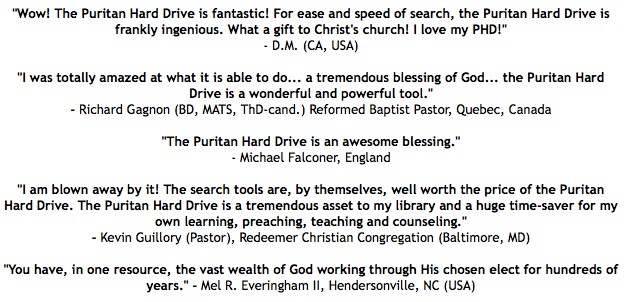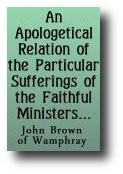 Loading... Please wait...
Loading... Please wait...- SWRB Home
-
Free Resources
- Short Listings Of Free Reformation & Creation Resources
- Free Reformed, Puritan, Covenanter and Creationist Videos
- Thousands of Links to Free Audio, Video and Printed Resources
- Free Puritan Books, Reformed MP3s, and Calvinist Videos
- Puritan Quotes, Free Reformation MP3s, Reformed Books and Calvinist Videos From PuritanDownloads.com On FaceBook
- Shipping & Returns
- Blog
- Privacy Policy
- Contact Us
- Payment Options
- Help
-
About Us
- Sitemap
Pastor Scott Brown, on the left in the video above, is the Director of the National Center for Family-Integrated Churches (NCFIC)
Resource Categories
- PURITAN HARD DRIVE REVIEWS
- PASTOR ROB VENTURA ON THE PURITAN HARD DRIVE
- DR. VODDIE BAUCHAM, JR. ON THE PURITAN HARD DRIVE
- R. C. SPROUL ON SWRB
- DR. JOEL R. BEEKE ON THE PURITAN HARD DRIVE
- PASTOR GREG L. PRICE ON THE PURITAN HARD DRIVE
- DR. MATTHEW MCMAHON ON THE PURITAN HARD DRIVE
- PASTOR SCOTT BROWN ON THE PURITAN HARD DRIVE
- PASTOR W. J. MENCAROW ON THE PURITAN HARD DRIVE
- JOAQUIN FERNANDEZ ON THE PURITAN HARD DRIVE
- PASTOR DAVID SILVERSIDES ON THE PURITAN HARD DRIVE
- JOHN HENDRYX ON THE PURITAN HARD DRIVE
- PASTOR KEVIN GUILLORY ON THE PURITAN HARD DRIVE
- RICHARD BENNETT ON THE PURITAN HARD DRIVE
- DR. KENNY RHODES ON THE PURITAN HARD DRIVE
- JUSTIN RAWSON ON THE PURITAN HARD DRIVE
- PASTOR JAMES WALLACE ON THE PURITAN HARD DRIVE
- PASTOR RICHARD GAGNON ON THE PURITAN HARD DRIVE
- PASTOR JOE HAYNES ON THE PURITAN HARD DRIVE
- DR. STEVEN DILDAY ON THE PURITAN HARD DRIVE
- PASTOR ANDREW COMPTON ON THE PURITAN HARD DRIVE
- TERENCE ELLARD ON THE PURITAN HARD DRIVE
- PASTOR JERRY JOHNSON ON THE PURITAN HARD DRIVE
- PASTOR DAVID PETRIE ON THE PURITAN HARD DRIVE
- JIM DODSON ON THE PURITAN HARD DRIVE
- PASTOR BRIAN SCHWERTLEY ON THE PURITAN HARD DRIVE
- PASTOR PHIL GIBSON ON THE PURITAN HARD DRIVE
- MEL R. EVERINGHAM II ON THE PURITAN HARD DRIVE
- PAUL BLYTH ON THE PURITAN HARD DRIVE
- STEVE KETTLER ON THE PURITAN HARD DRIVE
- D. M. (CALIFORNIA) ON THE PURITAN HARD DRIVE
- MICHAEL CAUGHRAN ON THE PURITAN HARD DRIVE
- WIILIAM NOPPER IV ON THE PURITAN HARD DRIVE
- LINDA THERIAULT ON THE PURITAN HARD DRIVE
- WILLIAM WARNOCK ON THE PURITAN HARD DRIVE
- ROBERT KOH ON THE PURITAN HARD DRIVE
- WHAT'S ON THE PURITAN HARD DRIVE?
- ALL PURITAN HARD DRIVE VIDEOS
- PHD-ODE INSTALLATION VIDEOS
- COMMENTS ON SWRB
- ALL PURITAN QUOTE VIDEOS
- PURITAN HARD DRIVE SCREENSHOTS
- PURITAN HARD DRIVE MINISTRY AND DONATION OFFERS
- TABLE OF RESOURCE CATEGORIES
- Advanced Studies
- SWRB SERMONAUDIO MOBILE APP
- Apologetics
- Assurance
- Attributes and Holiness of God
- Augustine
- Banner of Truth
- Baptism
- Beginners
- Bibles (Geneva, KJV, Hexapla, etc.)
- Biblical Counseling
- BIBLICAL HD COLLECTION
- Biblical Interpretation (Hermeneutics)
- Biographies and Autobiographies
- Calvinism and the Sovereignty of God
- CALVINISM HD COLLECTION
- CALVINIST CLASSICS HD COLLECTION
- Charles Spurgeon
- Children's Books
- CHRISTIAN EDUCATION HD COLLECTION
- Christian History
- Church Government
- Civil Government and Resistance
- CLASSIC CHRISTIAN HD COLLECTION
- Classic Puritan and Reformed Sets
- Commentaries
- Contemporary Issues
- Covenant Theology and Covenanting
- COVENANTER HD COLLECTION
- Covenanters and Covenanted Reformation
- Creation and Creationism
- Creeds, Confessions and Covenants
- Cults, False Religions, Psychology, Humanism
- Dealing with Affliction, Suffering, and Sickness
- Debates
- Dutch Reformed
- Education and Home Schooling
- English Puritans, Covenanters and Reformers
- Family, Children, Home, and Family Worship
- First Reformation
- Five Points of Calvinism (TULIP)
- For Pastors and Elders
- For Seminary Students
- FREE PURITAN & REFORMATION MP3 AUDIO SERMONS/BOOKS
- FREE PURITAN BOOKS, REFORMATION MP3s, PDFs, VIDEOs
- George Gillespie
- God's Law, The Ten Commandments, etc.
- Greg L. Price on Headcoverings
- Heaven, Hell and the Final Judgment
- Holy Days (Lord's Day, Christmas, Easter, etc.)
- HOME SCHOOL HD COLLECTION
- Intermediate Studies
- John Bunyan
- John Calvin
- John Knox
- John Owen
- Jonathan Edwards
- Justification
- Languages, Dictionaries, Reference, etc.
- LOOK WHO LOVES THE PURITAN HARD DRIVE
- Lord's Supper (Communion)
- Marriage, Courtship, etc.
- Martin Luther and Lutheranism
- Martyrs and Persecution
- Other Protestant Works
- Predestination and Providence
- PRESBYTERIAN HD COLLECTION
- Presbyterians and Presbyterianism
- Prophecy, Antichrist, and Eschatology
- PROTESTANT HD COLLECTION
- PSALM SINGING MP3s (COMPLETE SET)
- Psalters, Psalm Singing and Music
- Puritan Facts
- PURITAN FAST SERMONS (1640-1653) - 34 VOLS SET
- Puritan Fast Sermons 1640-1653
- Puritans and Puritanism
- PURITAN HARD DRIVE
- REFORMATION HD COLLECTION
- Reformation History
- Reformed and Puritan Classics
- Reformed Baptist
- REFORMED BAPTIST HD COLLECTION
- REFORMED HD COLLECTION
- REFORMED PRESBYTERIAN HD COLLECTION
- Reformed Presbytery, RPNA Protesters, etc.
- Reformed Theology
- Reformed Worship, The Regulative Principle, etc.
- Roman Catholicism, the Jesuits, Islam, etc.
- Salvation and Evangelism
- Samuel Rutherford
- Sanctification, Prayer and Holiness
- Scottish Covenanters
- Scottish Presbyterianism
- Scripture Song MP3s (Psalms and Bibles Verses)
- Second Reformation
- Separation, Unity, Uniformity, etc.
- Sermons and Sermon Collections
- Solemn League and Covenant
- Theology and Doctrine
- Third Reformation
- Thomas Watson
- Westminster Confession, Assembly and Divines
- Authors (All A to Z)
Phone Orders:
(780) 450-3730
To obtain free Reformation books, Puritan MP3s and Calvinistic videos, SWRB discount coupons, etc., add yourself to SWRB's Puritan and Reformed email list by using the form above.
An Apologetical Relation of the Particular Sufferings of the Faithful Ministers and Professors of the Church of Scotland Since 1660, Wherein Several Questions, Useful for the Time, Are Discussed, etc. by John Brown of Wamphray
Resource Details
Resource Description
John Brown of Wamphray was ejected in the "great ejection" of 1662 and thereafter imprisoned for speaking out against acknowledging the newly-appointed Archbishop of Glasgow. Later released from prison, upon condition of banishment, he left for the Netherlands in 1663. During these years he devoted himself to writing.
"Early in the year 1666 the Council was staggered by the dissemination of a little epoch-making book entitled 'An Apologetical Relation'... It was printed abroad in 1665... This treatise in twenty-three sections deals trenchantly with every aspect of the dispute, and powerfully maintains the righteousness of the principles and actions of the Covenanters, even to justifying their resistance to their unconstitutional governors. Acknowledging its dangerous import the Council at once proclaimed it seditious, ordered the hangman to burn it at the Cross, and attached a fine of 2000 pounds Scots to any possessor of it," notes Hewison (The Covenanters, vol. 2, p.189).
Furthermore, "His (Brown's) Apologetical Relation, or historic defence of the Church, and exposition and vindication of its principles, was much disliked by the Prelatic party in Scotland, and found a place in their Index Espurgatorius" (Carslaw, Exiles of the Covenant, p. 106).
The Reformed Presbytery adds further historical context to this famous work when they write, "new measures were again fallen upon for the oppression, suppression and extirpation of the true reformed religion, and the professors of it. The council being very diligent and careful to deprive the Lord's people of every thing which might contribute to their establishment and confirmation in the righteousness and equity of the cause and covenant of God for which they suffered, and which tended to expose their tyranny and treason against God, ordered the famous Mr. Brown's Apologetical Relation to be burnt in the high street of Edinburgh, on February 14th, 1666... such was their hellish enmity and and spite against our covenanted reformation, and every thing written in defense thereof, and in vindication of those that suffered for their adherence to it" (Act, Declaration and Testimony for the Whole of Our Covenanted Reformation, p. 28).
It is for works such as these that Johnston (in The Treasury of the Scottish Covenant, p. 339) says of Brown that "(h)e has been regarded (as) the most important theologian of the second period of Scottish Presbyterianism."
It has been further noted (by A.N.) regarding Brown (and this book in particular) that "his singular judiciousness and honesty, in being a faithful witness and wrestler for the purity of Reformation, appears very obvious in his piece entitled An Apologetical Relation, wherein he holds forth the dreadful and heinous nature of national perjury and covenant-breaking, and convincingly discovers that it is not in the power of the nations to shake themselves loose of their sacred obligations, either as to the matter or the manner of them; tho' to the great shame and unspeakable loss of these nations, the bulk and body of them have not only once or twice discovered their contempt in an open course of backsliding upwards of these hundred years past (See Apologetical Relation pages 328, 343. History of the Indulgence, page 132)" (cited in the preface to Brown's Exposition of the Epistle of Paul the Apostle to the Romans, p. v).
To understand the nature of the conflagration emanating from the pits of hell, to suppress the knowledge of the battle for Christ's Crown and Covenant, the history of this fight (which included the sufferings of many faithful martyrs), and why a new and similar struggle is ensuing, some 331 years after the initial writing of this book, pick up this indispensable weapon (extracted from the Presbyterian Armoury, vol. 3), and "ride to the sound of the gun."
Brown deals with "the lawfulness of defensive wars," the divine right of church government, the divine right of kings (and related political questions), the "Supreme Magistrate's Power in Church Matters," "the Rise, Reign and Ruin of the Former Prelates in Scotland," and much, much more!
224 pages.
All resources for sale on this website, with the exception of Scottish Metrical Psalms MP3s, are available on the Puritan Hard Drive .
VIDEO INTRODUCTION TO THE PURITAN HARD DRIVE


Find Similar Resources by Category
Phone Orders:
(780) 450-3730
To obtain free Reformation books, Puritan MP3s and Calvinistic videos, SWRB discount coupons, etc., add yourself to SWRB's Puritan and Reformed email list by using the form above.








































